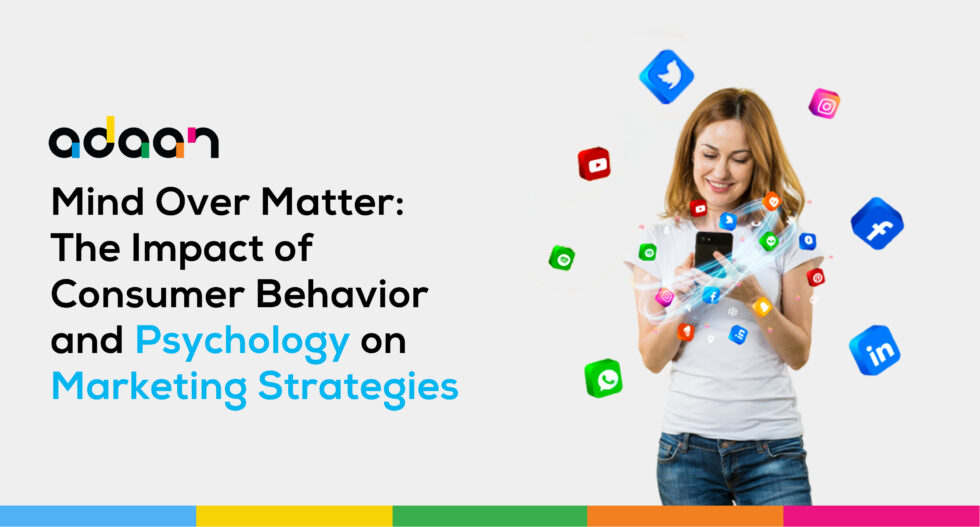Have you ever wondered why you often reach for that tempting chocolate bar at the checkout counter, even though you didn’t plan on buying it? Or why do you suddenly feel the urge to upgrade your smartphone when you see an enticing advertisement? The answer lies in the fascinating realm of consumer behaviour and the psychology of marketing.
Whether you shop at a store or online at an e-commerce website, your mind is constantly shaping your perceptions, preferences, and purchasing decisions. Understanding the inner workings of the human mind is no longer just the stuff of sci-fi movies; it’s a critical aspect of modern marketing strategies.
In today’s hyper-competitive business landscape, offering a great product or service must be supported by something that truly connects with consumers and drives sales higher. Businesses and brands can achieve this goal by delving into the intricacies of consumer psychology.
It’s about understanding what drives consumers to choose one brand over another, why they are more likely to respond to particular marketing methods, and how emotions, social influences, and cognitive biases impact their buying decisions.
Continue reading this article to uncover how our behaviour as consumers impacts the marketing strategies brands and businesses devise.
Navigating the Minds of Buyers Through Marketing Strategies
Consumer psychology is at the heart of every marketing strategy. By decoding and understanding the consumer mind, brands unlock the secret factors influencing our purchases. Marketers leverage these factors to create compelling ads, packaging, and branding that tap into our minds.
Let us try to understand these factors and how they affect our decision-making process.
Emotions
The most vital ingredient of the secret sauce that unveils consumer minds is our emotions. Think about the last time you bought something on impulse, driven by a sudden surge of excitement or desire. Maybe a pair of trendy sneakers made you feel like a fashion icon or a mouthwatering dessert that promised to satisfy your cravings.
Emotions like joy, fear, nostalgia, and many more can evoke strong reactions that impact our purchasing decisions, often overriding rational thinking. Marketers are well aware of this, and they skillfully craft their advertisements, packaging, and branding to tap into our emotions and create an emotional connection with their products.
Motivations
Consider the thrill of getting a great deal, the need to belong to a group, or the desire to impress others with a luxury purchase. These are factors that work as motivation for our purchases. Our motivations, whether they are physiological, social, or aspirational, influence our decision-making process.
Thus, marketers tailor their marketing messages to align with our motivations. They create ads that make us feel like we’re part of an exclusive club or offer discounts that tap into our desire for savings. By understanding what motivates us, marketers can nudge us towards purchasing.
Attitudes
We all have opinions and beliefs about products and brands, often based on past experiences, social influences, or personal preferences. All of these elements form our attitudes. These, in turn, impact our buying decisions, sometimes even more than practical considerations.
Marketers leverage this factor by building positive brand associations through effective branding, messaging, and reputation management. They create campaigns that resonate with our values, highlight positive reviews, and use influencers to endorse their products. By shaping our attitudes towards their brand, marketers can influence our decision-making process and foster brand loyalty.
Perception
Another significant ingredient is our perception of products. Think about how packaging, design, or product features can influence our perception of a product. For example, a sleek and minimalist design may convey a sense of sophistication and quality. At the same time, bright and playful packaging may appeal to a younger audience. Marketers carefully craft these elements to align with consumers’ perceptions and create a favourable impression influencing purchasing decisions.
Practical Applications of Consumer Psychology for Effective Marketing
In today’s hyper-competitive business landscape, understanding potential buyer behaviour has become a game-changer for marketers seeking to optimise their strategies and achieve better results. Let’s explore the importance of consumer behaviour in marketing and its applications.
Targeting Specific Consumer Segments Through Market Segmentation
Gone are the days of one-size-fits-all marketing. In today’s diverse and dynamic market, businesses must target specific consumer segments to connect with their audience truly. Companies can identify and target specific consumer segments with similar characteristics, behaviours, and preferences by understanding human psychology and using it efficiently while creating marketing strategies.
Suppose that you run a fitness apparel brand. Understanding your target market will involve identifying distinct segments like fitness enthusiasts, yoga lovers, and outdoor adventurers. Armed with this insight, you can create marketing strategies that cater to unique needs and motivations, such as tailored advertising messages, product bundles, and promotions that speak to the interests and aspirations of each segment.
Creating Personalized Marketing Experiences through the Use of Consumer Data
Consumer data, such as browsing behaviour, purchase history, and demographic information, has become a goldmine for businesses in the digital age. With the help of marketing psychology, brands can analyse such data and get insights into consumer preferences, motivations, and decision-making processes. This analysis aids in the creation of more efficient marketing strategies.
Imagine you’re an online retailer. By utilising consumer data, you may send personalised product recommendations to individual consumers based on their browsing and purchase history. You may also personalise your email marketing campaigns, social media ads, and website content to cater to each consumer’s unique needs and preferences. This level of personalisation makes consumers feel understood and valued, fostering a sense of connection and relevance with your brand.
Developing Effective Product Positioning Strategies
Positioning your products or services effectively in the minds of consumers is critical for success in today’s competitive market. The psychology in marketing can inform effective product positioning strategies that resonate with consumers and differentiate your brand from competitors. By aligning the positioning of your products or services with consumer needs, preferences, and motivations, you can create a compelling value proposition that speaks to consumers on a personal level.
Let’s say you’re a skincare brand. Understanding how consumers are increasingly concerned about the harmful effects of pollution on their skin, you may position your products as natural, organic, and pollution-fighting, catering to the growing demand for skincare products that address environmental concerns. This type of positioning aligns with consumer values and motivations, setting your brand apart from competitors and attracting consumers who resonate with your brand.
Crafting Compelling and Persuasive Advertising Messages
Advertising messages are critical in influencing buyer behaviour and driving purchase decisions. By understanding the cognitive, emotional, and motivational factors influencing consumer decision-making, businesses can create advertising messages that evoke positive emotions, highlight consumer benefits, and address consumer concerns or pain points.
For instance, a business that sells luxury watches may identify that consumers associate luxury watches with status, prestige, and exclusivity. They may then craft advertising messages highlighting these emotional benefits, using aspirational imagery, celebrity endorsements, and exclusive limited-time offers to create a sense.
The Challenges of Incorporating Consumer Psychology into Marketing Strategies
Marketing pros armed with data and ideas to conquer the market know that understanding buyer behaviour and psychology is no cakewalk. It is full of challenges, from ethical considerations to changing behaviours. Staying updated, interpreting research accurately, considering cultural factors, and balancing short-term gains with long-term relationships are essential.
Let’s look at some challenges marketers face while crafting their marketing strategies.
1. Ethical considerations: The ethical implications of using consumer psychology for marketing purposes require careful consideration to avoid manipulating or exploiting consumers. Balancing marketing goals with moral values and respecting consumer autonomy is a challenge that marketers must navigate.
2. Staying current with changing behaviours: Human behaviour is constantly evolving and influenced by various factors. Marketers must stay updated with the latest research and insights to understand changing consumer preferences, motivations, and decision-making processes. Proactive efforts to conduct market research, monitor consumer trends, and analyse data can help avoid this obstruction.
3. Accurately interpreting and applying research findings: Research studies on consumer psychology can be complex and subject to misinterpretation or misapplication of findings, resulting in flawed marketing strategies. Marketers need to critically evaluate research, consider its limitations, and tailor strategies to the specific context of their target audience.
4. Considering cultural and contextual factors: Cultural norms, customs, and contextual factors often influence buyer behaviour. Marketers must understand their target audience’s local culture, preferences, and behaviours to ensure that marketing strategies are relevant and resonant.
5. Balancing short-term gains with long-term relationships: While consumer habits can be leveraged to create short-term wins, building long-term relationships with consumers is essential for sustainable business success. Marketers need to balance short-term gains and long-term relationship-building to nurture a loyal customer base.
By addressing these challenges, marketers can develop marketing strategies that drive short-term results and build lasting customer relationships, leading to long-term business success. Marketers know mastering these challenges is essential to create effective and ethical marketing strategies that resonate with consumers and drive long-term business success.
Summing Up
Understanding the importance of consumer behaviour in marketing is like having a cheat code that allows them to connect with consumers on a more personal level. Businesses create marketing strategies that truly resonate with their audience by diving into the intricacies of human behaviour, such as emotions, motivations, attitudes, and perceptions.
When marketing messages resonate with their motivations and establish authentic brand perceptions, it’s like hitting the jackpot in consumer connection! But it’s not just businesses that benefit from understanding consumer psychology. It is a research field that also empowers consumers to become savvy decision-makers, aware of the psychological influences in their choices.
So, whether you’re a business owner, a marketer, or just someone interested in understanding how consumers tick, remember that consumer habits are the key to creating meaningful connections and driving positive outcomes. It’s the secret sauce to winning hearts and minds, building lasting relationships, and achieving success in the ever-evolving world of consumers.
Frequently Asked Questions
1. What are consumer behaviour and psychology in marketing?
Consumer behaviour and psychology in marketing refer to the study of how consumers make decisions, behave, and perceive information related to products or services. It involves understanding their motivations, emotions, beliefs, and behaviours that influence their buying decisions.
2. Why is understanding consumer behaviour and psychology important for marketing strategies?
Understanding consumer behaviour and psychology is crucial for marketing strategies because it allows companies to tailor their marketing efforts to meet the needs and preferences of their target audience. It helps identify consumer segments, predict their behaviour, and design effective marketing campaigns that resonate with consumers, leading to higher sales and customer satisfaction.
3. Can you provide some examples of how consumer behaviour and psychology are applied in marketing?
Examples of how consumer behaviour and psychology are applied in marketing include:
- Targeting specific consumer segments through market segmentation
- Creating personalised marketing experiences through the use of consumer data
- Developing effective product positioning strategies
- Crafting compelling and persuasive advertising messages
4. What are some challenges of using consumer behaviour and psychology in marketing?
Challenges of using consumer behaviour and psychology in marketing include
- Ethical concerns
- Complexity and variability
- Data privacy and security
5. How can companies use consumer behaviour and psychology ethically and effectively in their marketing strategies?
Companies can ensure the ethical and effective use of consumer behaviour and psychology in their marketing strategies by
- Conducting market research and consumer surveys with transparency and informed consent while protecting consumer privacy.
- Avoid deceptive or manipulative marketing tactics that exploit consumer vulnerabilities or emotions.
- Ensuring that marketing efforts are aligned with consumers’ values, needs, and preferences and delivering on promises made in marketing campaigns.
- Monitoring and evaluating the impact of marketing strategies on consumer behaviour and making adjustments as needed.
- Complying with relevant laws and regulations related to consumer protection, data privacy, and advertising standards.
- Providing consumers with clear and honest information about products or services and addressing consumer grievances promptly and transparently.






